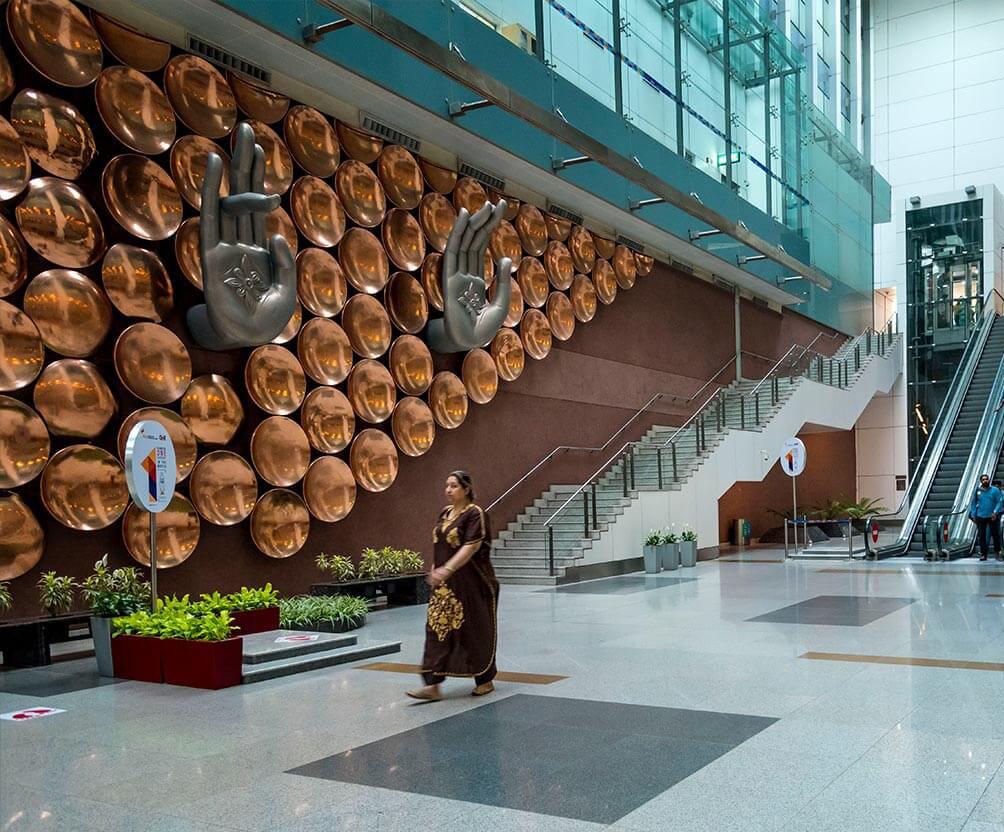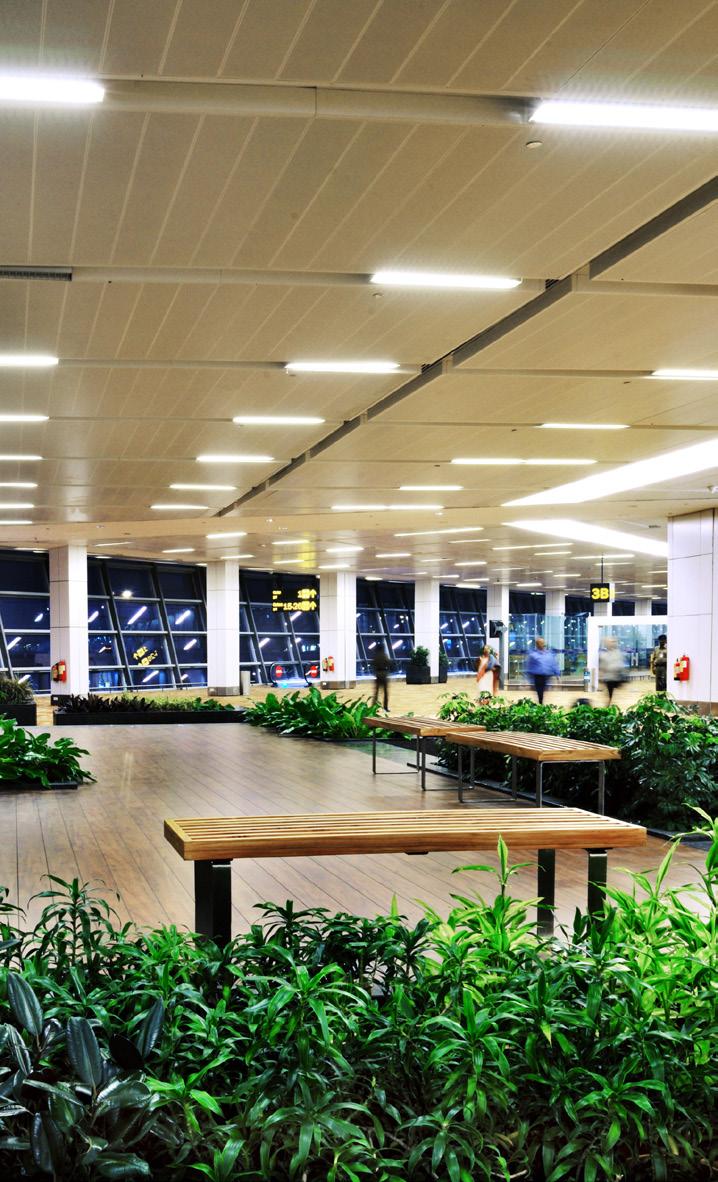
6 minute read
LEADING BY EXAMPLE

Being one of the world’s most environment friendly and sustainable gateways is a top priority for Delhi’s Indira Gandhi International Airport, writes CEO, Videh Kumar Jaipuriar.
Advertisement
Airports have always been in the spotlight when it comes to their impact on the environment and the steps taken by them to operate in a sustainable manner, and Delhi’s Indira Gandhi International Airport (DEL) is no exception.
Fortunately, Delhi International Airport Limited (DIAL) – the GMR Infrastructure-led consortium that manages and operates DEL – is 100% committed to being at the forefront of environmental protection and sustainable development.
Indeed, Delhi Airport has integrated sustainability into its operations and infrastructure and, over the years, has remained focused on upholding high service standards and operational excellence.
Today, Delhi Airport has become the benchmark for other airports to emulate, especially when it comes to sustainability. It is set to become a Net Zero Carbon Emission Airport by 2030, for example, way ahead of the IPCC’s 2050 target adopted by most major industries across the world.
The sustainability framework of Delhi Airport is focused on: • Creating economic value • Delivering service excellence • Caring for the environment • Improving quality of life. As a result, DIAL strives to be a leader in environment sustainability management by adopting sustainable development practices, ‘green’ infrastructures and environmentally friendly initiatives.
In fact, after meticulously monitoring the global and national sustainability requirements and commitments for the airport business, we have incorporated them into our business strategy.
So, DIAL follows the United Nations’ Sustainable Development Goals (SDG 2030), ICAO’s environmental objectives, and all other relevant governmental initiatives designed to transform airports into a more sustainable and environment friendly business.
At Delhi Airport we have whole heartedly embraced ACI’s Airport Carbon Accreditation (ACA) programme, which is the only global framework for airports to manage and reduce carbon emissions.
I believe that Delhi Airport was one of the first gateways in the region to be accredited and, in 2016, this led to us becoming the first airport in the Asia-Pacific region to achieve Level 3+ ‘Neutrality’ status.


to achieve Level 4+ ‘Transformation’ status in the programme.
As I said earlier, we are now working towards the goal of becoming a net zero carbon emissions airport by 2030, and in line with this strategy DIAL has initiated a host of environmental sustainability initiatives to further lower Delhi Airport’s carbon footprint.
These have included the use of a ‘TaxiBot’ to tow aircraft between gates and the apron/airfield, and improving operational efficiency through Airport Collaborative Decision Making (A-CDM).
The TaxiBot alone has helped us reduce our CO2 emissions by more than 1,154 tonnes since being adopted by Delhi Airport in May 2019, saving the airlines in excess of 365 tonnes of aviation turbine fuel (ATF) in the process.
A-CDM, of course, not only improves air traffic flows and capacity management at airports by reducing delays and improving the predictability of events, but it also helps to optimise the utilisation of resources.
On the airfield itself, I would like to note that we take every precaution to reduce contamination and emissions, particularly with regards to some of the safeguards built into Delhi Airport’s massive 16 kilometre long fuel hydrant system to prevent soil contamination, water pollution and air emissions and support safe operations by reducing leakage, spillage and evaporation losses.
Elsewhere, we have installed Bridge Mounted Equipment (BME) in 78 airbridges in Terminal 3. The bridge-mounted equipment consists of a fixed electrical ground power unit (FEGPU) and Pre-Conditioned Air (PCA) that effectively making noisy, CO2 polluting Auxiliary Power Units (APUs) redundant. We will be installing an additional 22 BMEs in Terminal 1 as a part of its development.
DIAL has also introduced electric bus services for transporting passenger around the airport site. Metro line trains provide fast, convenient and environmentallyfriendly connections between all three terminals and, ultimately, New Delhi.
Another noteworthy strategy of DIAL is our commitment to building ‘green’ and resilient infrastructure at Delhi Airport. Terminal 3, for example, was the first LEED Gold certified terminal building in India under the ‘New Construction’ category and achieved Platinum rating from the Indian Green Buildimng Council (IGBC) in 2016.
The United States Green Building Council (USGBC) followed suit in 2019 when Delhi Airport’s iconic Terminal 3 became the first airport terminal in the world to receive its Platinum certification for Performance Excellence in Electricity Renewal (PEER).
We are now redeveloping Terminal 1 as per LEED standard, which we expect to be be commissioned in 2023. The revamp will increase its capacity from 20 million to 40 million passengers per annum and integrate the Arrivals and Departures facilities under one roof.
Delhi Airport is also the first airport in the world to have adopted an ISO 50001:2018 certified Energy Management System. This system improves the energy performance of the organisation by making better use of the energyintensive assets, and through these concerted efforts,

DIAL has reduced both fuel and electricity consumption over the years.
Our commitment to a green and clean environment was the motivation behind the installation of a 7.84MW solar power plant on the airport site.
DIAL has also signed a long-term power purchase agreement with a hydropower plant. The plant, expected to be commissioned by 2022-23, will supply the entire electricity need of the airport, ensuring a clean energy supply to Delhi Airport.
Sustainable water management is another key focus area of DIAL. As of today, DIAL has around 350 rainwater harvesting structures and this will increase significantly under the current airport expansion plans.
Indeed, DIAL has developed facilities to store 6.9 million litres of rainwater and is installing another 250+ water harvesting structures.
In addition, the 16.6 million litres of water per pay (MLD) zero liquid discharge sewage treatment plant of DIAL ensures that all sewage water is treated and reused for applications such as horticulture, toilet flushing and HVAC make up water.
DIAL has also initiated an organisation-wide ‘waste to wealth’ programme to enhance the sustainability of waste management in general.
To facilitate this programme, DIAL is currently in the process of developing an Integrated Solid Waste Management Centre (ISWMC) consisting of a material recovery facility and biogas plant on the airport site. The plant is expected to be commissioned by the end of 2022 and will have an initial waste processing capacity of 12 tonnes per day.
In line with the Indian government’s move to be a Single-Use Plastic Free Country by 2022 and our own commitments to protecting the ecosystem, Delhi became a single-use plastic free airport in 2019. India’s CII-ITC Centre of Excellence for Sustainable Development recognised this achievement in February 2020 when we were officially certified as a Single-Use Plastic Free Airport (SUPFA).
DIAL’s ever evolving efforts to protect the environment and ensure the sustainable development of Delhi’s Indira Gandhi International Airport have also led to a number of other awards and accolades.
In addition to those mentioned above, sustainability accolades awared to DIAL in the last five years have included: • Winning a prestigious Green Airports Recognition award for Delhi Indira Gandhi International Airport from ACI-Asia Pacific for five years in a row between 2017 and 2021. • DIAL being rated as a ‘Climate Oriented’ company under Climate Action Programme (CAP 2 Degree) by the Confederation of Indian Industries (CII) in both 2019 and 2020. • Winning the National Award for Excellence in Energy Management from the Confederation of Indian Industry (CII) every year since 2018. • Receiving a National Water Award 2019 from the Indian government. • Being presented with a water conservation award from the Federation of Indian Chambers of Commerce & Industry (FICCI) in 2022.










